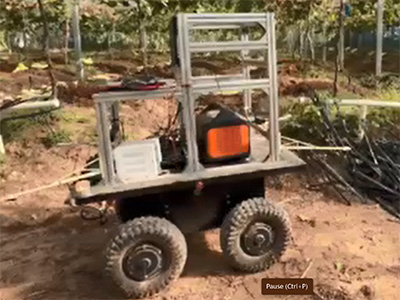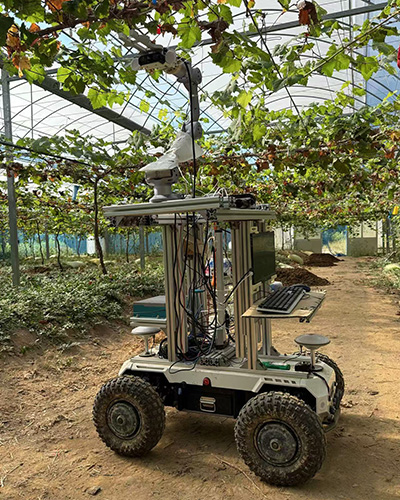II. Core technologies and functions
1. Navigation system adapted to agricultural environment
Equipped with a variety of sensors, including GPS, visual sensors, geomagnetic sensors, etc. This multi-sensor fusion method enables the robot to accurately navigate in complex agricultural terrain, whether it is muddy field paths, uneven orchard ground or mountain farms with a certain slope.
With the ability to plan paths, it can automatically plan the optimal transportation route according to the farm's terrain and transportation task requirements, avoiding obstacles such as crops and irrigation facilities in the farmland, while taking into account the changes in roads under different seasons and weather conditions.
2. Diversified cargo design
Considering the diversity of agricultural transportation, its cargo structure is rich. There is a box-type cargo area for transporting agricultural products, which is equipped with adjustable shelves and buffer devices inside, which can effectively protect fruits, vegetables and other fragile agricultural products from collision and squeezing during transportation.
There is also a flatbed cargo area for transporting agricultural production materials (such as fertilizers, pesticides, farm tools, etc.), which is equipped with fixing devices to prevent the goods from sliding during transportation, and the cargo capacity can be adjusted according to actual needs.
3. Intelligent interaction and control function
It can be connected to the farm's management system or the farmer's mobile device. Farmers can remotely issue transportation instructions through mobile phones or computers, and set parameters such as transportation routes, cargo types and destinations.
The robot itself has an intelligent control system that can automatically adjust the driving speed and power output according to the weight of the goods being transported and the road conditions to ensure the safety and stability of the transportation process. At the same time, it can send alarm information to farmers in time when encountering emergencies (such as bad weather, equipment failure, etc.).
III. Performance characteristics
1. Efficient transportation capacity
With a large cargo capacity and suitable driving speed, it can complete the transportation of a large amount of agricultural products or means of production in a short time. In the harvest season, the picked crops can be quickly transported from the field to the warehouse or processing site, improving the efficiency of the entire agricultural production process.
It can operate continuously without being restricted by manual rest time, effectively utilizing the key time window of agricultural production, and reducing the loss of agricultural products caused by untimely transportation.
2. High adaptability to agricultural environment
Its tires or tracks are designed specifically for agricultural ground conditions and have good grip and passability. It has excellent waterproof, dustproof, corrosion-resistant and other properties, and can operate stably for a long time in harsh outdoor agricultural environments.
It has a wide range of adaptability to environmental factors such as temperature and humidity. Whether it is hot summer or cold winter, it can work normally to ensure that agricultural transportation is not affected by seasons and climate.
3. Easy operation and high safety
The operation interface is simple and easy to understand, and farmers can operate it without complex training. The robot has a complete safety protection mechanism during operation, including automatic obstacle avoidance, anti-rollover, emergency braking and other functions to ensure operation safety in densely populated farm environments.
Fourth, Advantages
1. Alleviate the shortage of agricultural labor
With the current decreasing agricultural labor force, agricultural transport robots can replace a large number of manual transportation work, freeing the labor force from heavy transportation tasks, allowing farmers to focus more on the core links of agricultural production, such as planting and picking.
2. Improve the quality of agricultural products and reduce losses
Through stable and efficient transportation, agricultural products can be transported and stored in the best condition, reducing damage and deterioration of agricultural products caused by bumps, delays, etc., thereby improving the quality and market value of agricultural products.
3. Promote the modernization of agriculture
As part of agricultural intelligent equipment, agricultural transport robots promote the automation and intelligence of agricultural transportation links, improve the modernization level of the entire agricultural production, enhance the competitiveness of the agricultural industry, and provide strong support for the sustainable development of agriculture.


